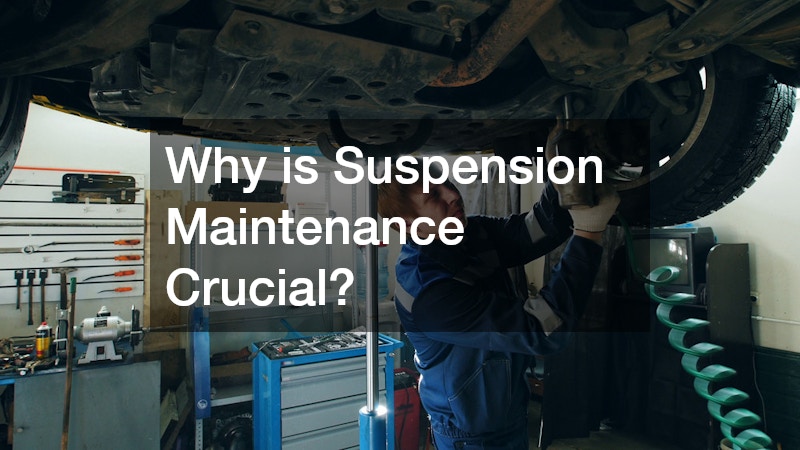The suspension system plays a critical role in the safety and comfort of vehicles. It acts as the link between the vehicle’s frame and its tyres, directly influencing handling, stability and passenger wellbeing. Far from being just a mechanical feature, it determines how securely a car grips the road and how pleasant the ride feels. In this article, we explore the importance of this system, looking closely at the way it contributes to safety, ride quality and long-term reliability.
How Does Vehicle Suspension Impact Safety?
A vehicle’s suspension is essential to keeping drivers and passengers safe. Beyond its role in softening the jolts from potholes or bumps, it works to maintain tyre contact with the road.
This allows better steering response, shorter braking distances and more reliable performance in unpredictable conditions.
The Role of Shock Absorbers
Shock absorbers are one of the most recognisable components in the system. Their purpose is to manage the energy from road impacts, reducing the bounce that would otherwise throw a vehicle off balance. Without them, passengers would experience constant jolting, and tyres would lose traction during rough stretches. By keeping the vehicle steady, shock absorbers protect both comfort and control.
Stability Control and Its Importance
A well-designed suspension assists in preventing rollovers and ensures stability when a vehicle is forced into sudden turns or evasive manoeuvres. By evenly distributing weight during sharp movements, it allows drivers to retain control instead of fighting against sway or lean. For large vehicles such as SUVs and utes, this stability is especially important in avoiding accidents.
Suspension and Brake Efficiency
Braking performance is closely tied to suspension health. When the system is functioning properly, weight is distributed evenly across all four wheels, allowing brakes to apply force consistently. If worn components interfere with this balance, the vehicle may nose-dive, skid or stop unevenly, which becomes particularly dangerous in emergency situations.
How Does the Suspension System Affect Comfort?
Safety may be the primary consideration, but passenger comfort is equally significant. A long trip in a vehicle with a poor ride can be physically exhausting and frustrating. Modern design seeks to strike a balance between smoothness and firmness.
Ride Quality and Passenger Comfort
The way a suspension is tuned determines how much of the road surface passengers feel. Too soft, and the car may wallow when cornering; too firm, and every bump becomes noticeable. Manufacturers invest heavily in fine-tuning this balance to deliver a ride that suits the vehicle’s purpose, whether it be city commuting, long-distance touring or off-road driving.
Noise, Vibration and Harshness (NVH) Control
Another important factor is how the system minimises noise, vibration and harshness. By isolating the cabin from road imperfections, passengers enjoy a quieter ride with less fatigue. Effective NVH control also protects the vehicle from unnecessary wear and tear, helping components last longer.
What Are the Different Types of Suspension Systems?
Independent vs Dependent Suspension
Independent suspension allows each wheel to move separately, improving grip and comfort by reducing the impact of uneven road surfaces. Dependent systems, where wheels are connected by a solid axle, are stronger and better suited to heavy loads but provide less refinement in ride quality.
Air Suspension Systems
Air suspension is increasingly found in luxury and performance vehicles. By replacing traditional springs with airbags, these systems offer adjustable ride height and improved comfort. Drivers can lower the vehicle for efficiency on highways or raise it for rough terrain, making it versatile and highly adaptable.
Why is Suspension Maintenance Crucial?
Like any mechanical system, it requires consistent care to perform at its best. Ignoring maintenance can lead to dangerous handling, reduced braking power and unnecessary strain on other components.
Common Suspension Problems and Signs
Signs of trouble include uneven tyre wear, pulling to one side, knocking noises over bumps and a noticeably rougher ride. These issues are not just inconvenient but can also compromise safety if left unresolved.
Maintenance Tips for Prolonged Suspension Lifespan
Drivers can extend the life of their vehicle’s systems by inspecting tyres regularly, scheduling wheel alignments and addressing any unusual sounds or performance changes promptly. Replacing worn components before they fail completely helps prevent costlier repairs and keeps the vehicle operating safely.
The suspension system is more than a comfort feature – it is a critical part of vehicle safety. By supporting stability, improving braking and ensuring passengers enjoy a smooth ride, it enhances every aspect of the driving experience. Regular maintenance and awareness of warning signs help ensure vehicles remain safe, reliable and enjoyable to drive. Understanding the role of suspension highlights its importance not only in protecting lives but also in preserving the quality and longevity of every journey.

